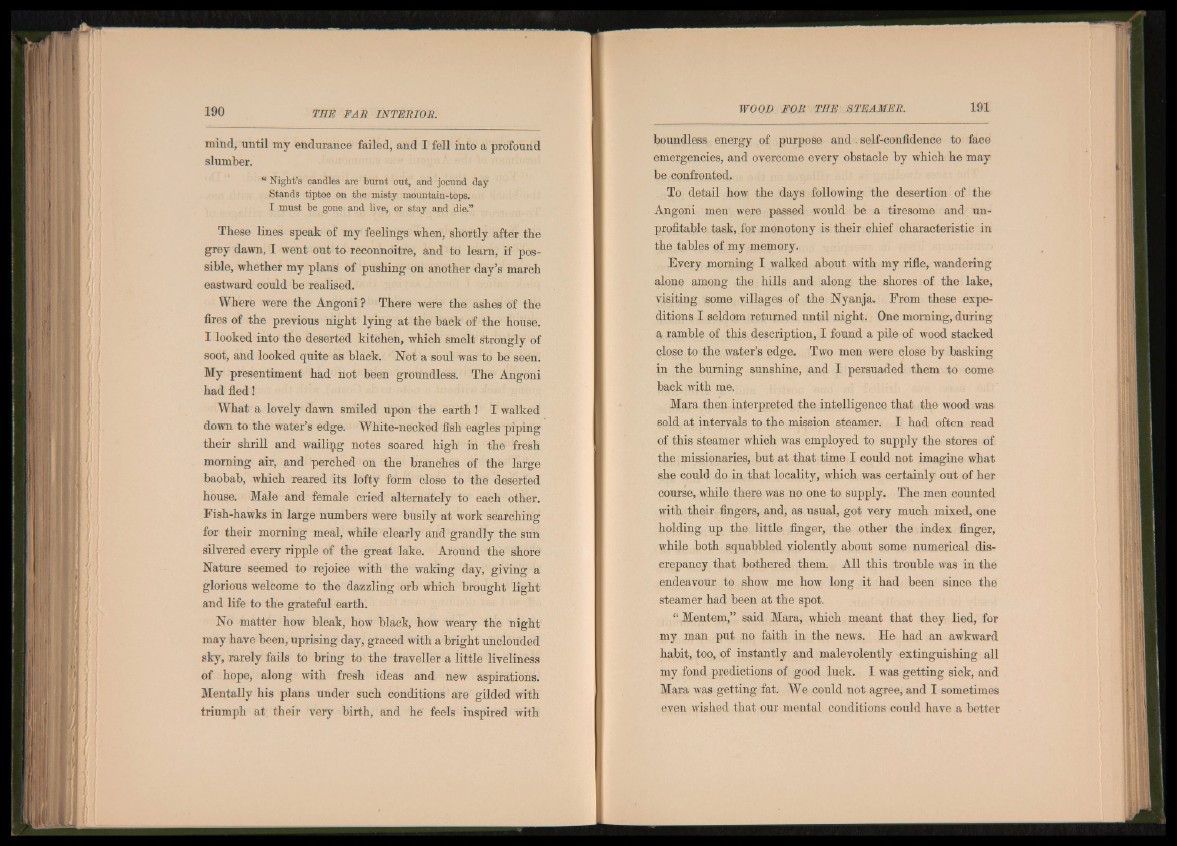
mind, until my endurance failed, and I fell into a profound
slumber.
“ Night’s candles are burnt out, and jocund day
Stands tiptoe on the misty mountain-tops.
I must he gone and live, or stay and die.”
These lines speak of my feelings when, shortly after the
grey dawn, I went out to reconnoitre, and to learn, if possible,
whether my plans of pushing on another day’s march
eastward could be realised.
Where were the Angoni ? There were the ashes of the
fires of the previous night lying at the back of the house.
I looked into the deserted kitchen, which smelt strongly of
soot, and looked quite as black. Not a soul was to be seen.
My presentiment had not been groundless. The Angoni
had fled!
What a lovely dawn smiled upon the e a rth ! I walked
down to the water’s edge. White-necked fish eagles piping
their shrill and wailipg notes soared high in the fresh
morning air, and perched on the branches of the large
baobab, which reared its lofty form close to the deserted
house. Male and female cried alternately to each other.
Fish-hawks in large numbers were busily at work searching
for their morning meal, while clearly and grandly the sun
silvered every ripple of the great lake. Around the shore
Nature seemed to rejoice with the waking day, giving a
glorious welcome to the dazzling orb which brought light
and life to the grateful earth.
No matter how bleak, how black, how weary the night
may have been, uprising day, graced with a bright unclouded
sky, rarely fails to bring to the traveller a little liveliness
of hope, along with fresh ideas and new aspirations.
Mentally his plans under such conditions are gilded with
triumph at their very birth, and he feels inspired with
boundless energy of purpose a n d . self-confidence to face
emergencies, and overcome every obstacle by which he may
be confronted.
To detail how the days following the desertion of the
Angoni men were passed would be a tiresome and unprofitable
task, for monotony is their chief characteristic in
the tables of my memory.
Every morning I walked about with my rifle, wandering
alone among the hills and along the shores of the lake,
visiting some villages of the Nyanja. From these expeditions
I seldom returned until night. One morning, during
a ramble of this description, I found a pile of wood stacked
close to the water’s edge. Two men were close by basking
in the burning sunshine, and I persuaded them to come
back with me.
Mara then interpreted the intelligence that the wood was
sold at intervals to the mission steamer. I had often read
of this steamer which was employed to supply the stores of
the missionaries, but at that time I could not imagine what
she could do in that locality, which was certainly out of her
course, while there was no one to supply. The men counted
with their fingers, and, as usual, got very much mixed, one
holding up the little finger, the other the index finger,
while both squabbled violently about some numerical discrepancy
that bothered them. All this trouble was in the
endeavour to show me how long it had been since the
steamer had been at the spot.
I Mentem,” said Mara, which meant that they lied, for
my man put no faith in the news. He had an awkward
habit, too, of instantly and malevolently extinguishing all
my fond predictions of good luck. I was getting sick, and
Mara was getting fat. We could not agree, and I sometimes
even wished that our mental conditions could have a better